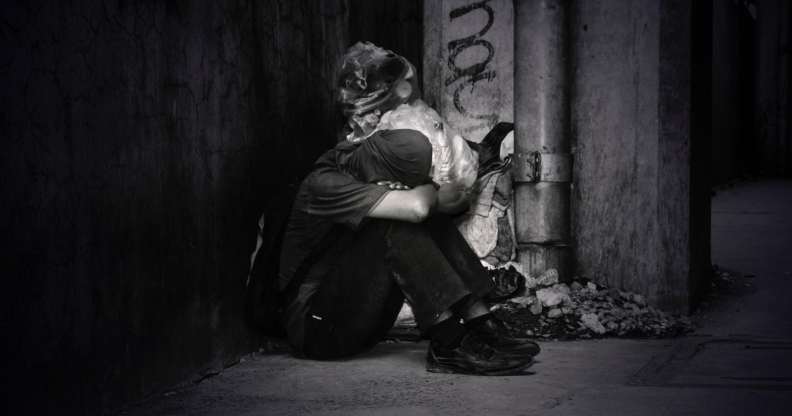Homelessness Minister Nigel Adams: How we’ll get vulnerable LGBT people off the streets

On Monday, the UK government issued its rough sleeping strategy with the aim of ending rough sleeping by 2027. Homelessness Minister Nigel Adams writes for PinkNews about the impact of homelessness on the LGBT community.
Many of our streets have been filled with happiness, bright colours and laughter during Pride events in recent weeks. But when the parties subside the streets can tell a very different story.
According to the Albert Kennedy Trust – who does brilliant work to support young people – 24 percent of homeless young people identify as LGBT. This is a shocking statistic and one, as Homelessness Minister I cannot ignore.
And although not all of these vulnerable people are sleeping on the streets every night – some will be sofa-surfing or staying with friends – we know many of them will have slept rough.
The stories are heartbreaking – of people forced onto the streets due to parental rejection or abuse and, once on the street, being sexually exploited, suffering mental health issues or being subjected to homophobic bullying.
Many people abuse drugs and alcohol as a way to escape.
We are fortunate to live in one of the most successful, advanced and fair-minded countries in the world.
Yet, despite this, too many people – including those identifying as LGBT – still sleep rough on our streets on any given night in England.
The human cost of this, in broken lives too often cut short, is unacceptable and I am determined to tackle it.
This is why I have today launched our Rough Sleeping Strategy, which sets out our ambition to achieve our manifesto pledge of halving rough sleeping by 2022 and ending it for good by 2027.
It is based around three core pillars: Prevention, Intervention and Recovery.
The first, prevention, is at the heart of our approach, focusing on helping before someone becomes homeless, building on the foundation of new legislation we introduced – the Homelessness Reduction Act.
The second, intervention, looks at assisting those already in crisis, giving them swift, targeted support to get them off the streets.
Under the third, recovery, we will help people find a new home quickly so they can rebuild their lives.
As part of this plan, we committed to conduct research into LGBT homelessness in the LGBT Action plan published on 3 July.
This is because, whilst we have a lot of anecdotal evidence and some research carried out by charities, this is fragmented and the overall national picture is unclear.
If we are to going to bring forward measures to prevent people from ending up on the street, we must fully understand why they are there in the first place.
So, as part of the strategy, we will be building our understanding of LGBT people’s experiences of homelessness – ensuring we talk to those suffering up and down the country to root out contributing factors.

Conservative MP Nigel Adams leaves the home of former London mayor and Brexit campaigner Boris Johnson in London on June 28, 2016. (ODD ANDERSEN/AFP/Getty)
Only then we will be able to put in place the right measures, so no-one is ever forced to bed down on our streets again. We have committed to setting out concrete next steps to addressing homelessness in our first annual refresh of the Rough Sleeping Strategy.
But what about those already sleeping rough, or people recovering from time spent on the street?
Our strategy outlines how we will intervene now – including providing new training for frontline staff on how to help people under the influence of Spice and those who are victims of modern slavery, as how to effectively support LGBT people.
And we also cannot underestimate just how vital having your own front door is to someone’s sense of security, hope and recovery.
So at the heart of our plan is a housing-led approach – finding people a safe place to live where they will be supported to tackle issues that may hamper efforts to rebuild their lives.
Rough sleepers, including those who identify as LGBT, are some of the most vulnerable in our society – they need our unwavering support.
Through our expert-backed strategy, I am confident they will get it.
Nigel Adams is a Member of Parliament for Selby and Ainsty in North Yorkshire, and also serves as acting Homelessness Minister.

